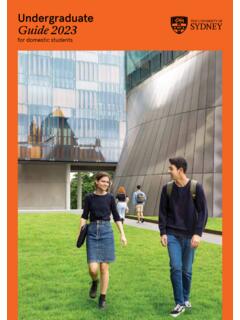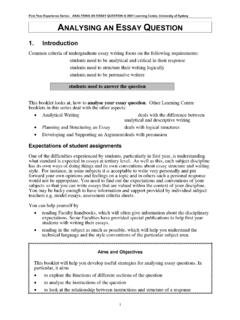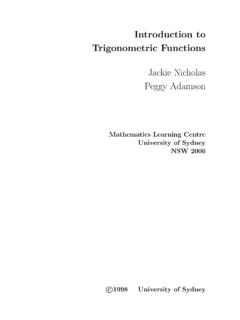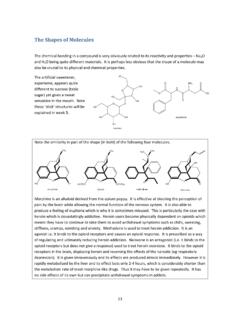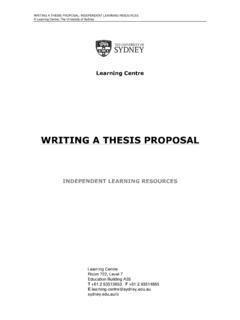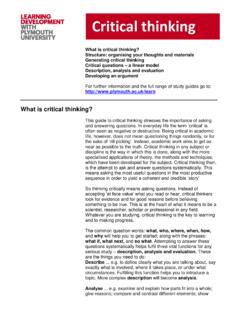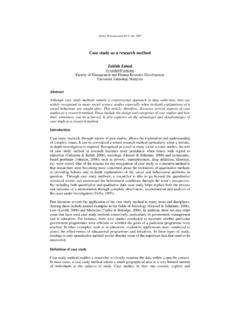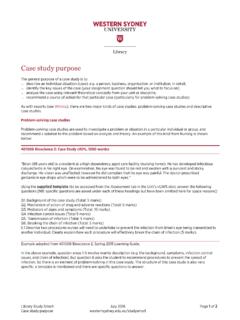Transcription of REFLECTIVE WRITING - University of Sydney
1 Learning Centre, University of Sydney 2019 1 REFLECTIVE WRITING Learning Centre, University of Sydney - Reflection is a core skill for your University work. What it means will depend on your particular assignments, the subjects you are studying, your discipline area of study, and so forth. This resource will introduce you to different kinds of REFLECTIVE WRITING at University , the types of assignments that call for REFLECTIVE WRITING , different levels of reflection, some language strategies and example texts.
2 What is REFLECTIVE WRITING ? The word reflection is often used as a broad term that covers a variety of WRITING practices at University . In most cases at University , you are required to link your reflection whether on a problem, your practice, your values, or society to theories. Different types of reflection the focus can be on one or more of these aspects. Types of REFLECTIVE WRITING 1. REFLECTION: when you ask questions about something you would like to better understand, a problem to solve or an issue to consider.
3 2. REFLECTIVE PRACTICE: when you reflect on the relationship between practice in your area of study and the theories you are being introduced to. 3. CRITICAL SELF-REFLECTION: when you consider how you are situated within broader social and institutional contexts, and to identify assumptions that you have not been aware of, challenging questions and Appendix 1 for more detail. Types of REFLECTIVE WRITING assignments Critical reflection is often assessed through a wide variety of tools, such as learning and REFLECTIVE journals, reports, reflection papers, case studies, or narratives.
4 These types of assignments are increasingly popular in applied disciplines such as marketing, business, accounting, nursing, health sciences, social work or education. While different disciplines tend to have different approaches to critical reflection, most tend to focus on a central case which is often written around a particular or problematic story sometimes referred to as a learning event or critical incident . This usually involves observations of the critical incident/case, which could be a person, an event, policy or scenario.
5 Various factors, themes or problems are then analysed with reference to an appropriate theory, framework, policy or methodology. These types of REFLECTIVE assignments are often referred to as analytical. Another common type of REFLECTIVE WRITING is problem-oriented: in addition to including all the above-mentioned elements, this type also requires you to draw appropriate conclusions in the form of suggestions for change, for instance, improvement of policies or making recommendations to take a course of action.
6 These types of assignments often involve an understanding of ethical components of particular applied disciplines, for instance, education, social work or nursing. Learning Centre, University of Sydney 2019 2 Prompts for REFLECTIVE WRITING For a critical reflection, based on specific events (or possibly critical incidents ): 1. Describe the event (what, when, where, who?) 2. Why have you chosen this event /s to reflect on? 3. What kinds of emotions does this event involve ( at the time) 4. What actions did you take: a.
7 At the time. b. subsequently. To think more deeply and critically, and to see connections between ideas: Has the way you see the event changed over time? Why? Can you connect the event to broader contexts, socio-cultural, historical, political? Can you think about the event in light of broader contexts ( social, cultural, historical, political, etc.)? Can you challenge or question your own responses and/or actions during or after the event, or those of other people involved? Are there any unanswered questions or dilemmas raised in your reflection on the event, conflicting interpretations, gaps in your knowledge?
8 What have you learnt based on your reflection and how might this new learning influence your future actions? (Adapted from Fook & Gardner, 2007) Levels of reflection When you reflect, you can do so at differing levels. Which is appropriate will depend on the requirements of your assignments. Three levels have been identified (Moon, 2001, 2003): descriptive, analytical and critical. At all three levels, you will need to describe the event itself, providing details about what, where, when, the event took place and who was involved, but you will also identify the emotions involved.
9 In many of your REFLECTIVE WRITING assignments, you will be required to write at either the second (analytical) and third (critical) levels. Reflections at the descriptive level tend to be more like diary entries, and are not usually appropriate for University assignments. Levels of reflection from descriptive to critical reflectionDescriptive The most foundational level is descriptive. At this level, the reflector focuses most of their attention on the story and describes events in a subjective manner without identifying connections, acknowledging alternative viewpoints or challenging their own interpretations.
10 Analytical The second level is analytical, in which the reflector manages to achieve some distance from the event. They consider alternative interpretations of the event and see connections between different perspectives provided, including those gained with the hindsight of experience. Critical The third level is critical at which point the reflector achieves an even broader perspective and connects the chosen learning event itself and their own interpretations (as well as those of other relevant parties) to multiple contexts, including historical and socio-political perspectives.


